Published Oct 25, 2023
Star Trek's Best Opera Moments, Ranked
It's World Opera Day, so time for a 'Liszt.'
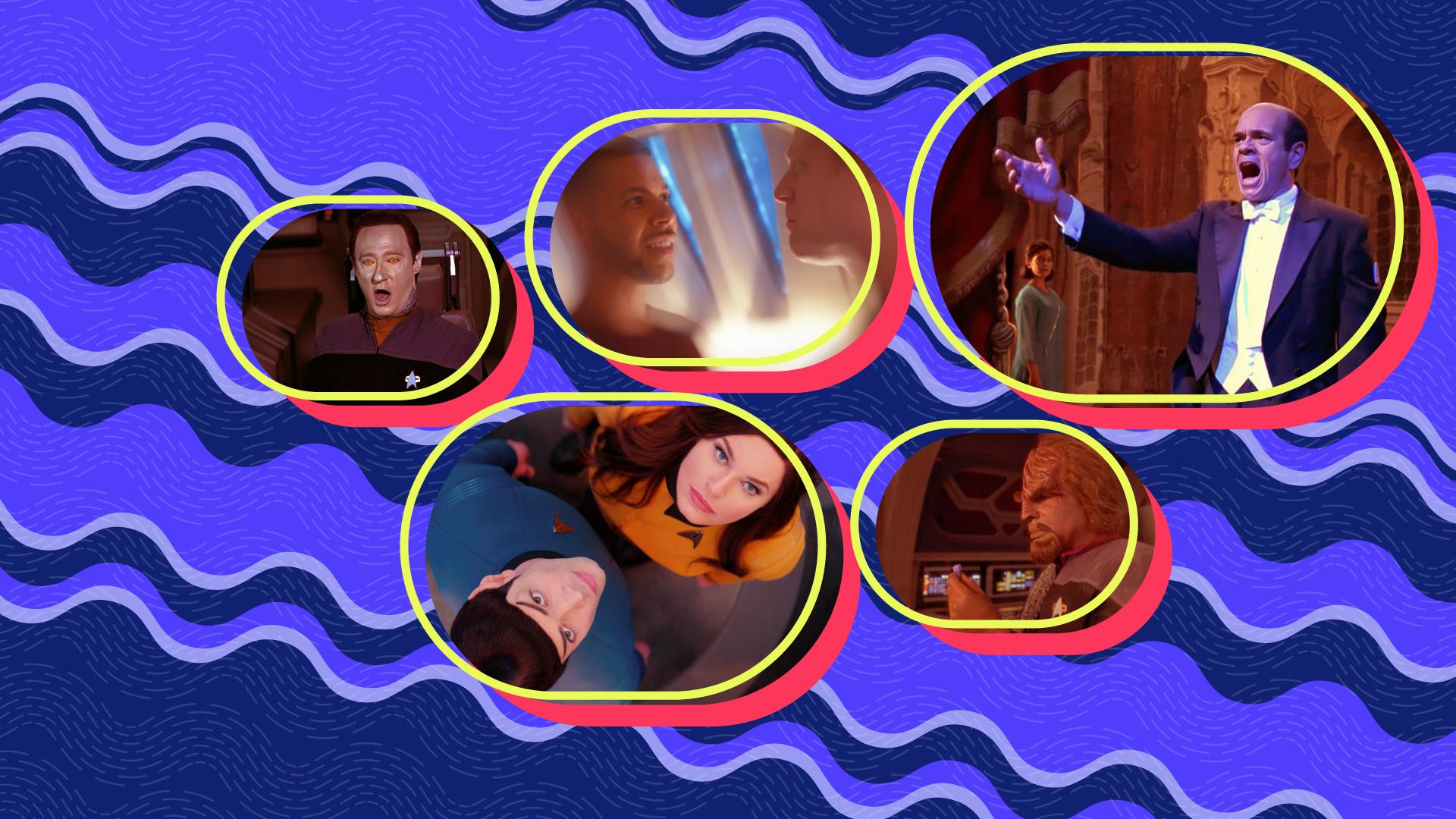
StarTrek.com
While Star Trek is best known for looking to the future, the show has also never wasted an “opera-tunity” to delve into classical music. Over the years, characters have enjoyed performances or dabbled in opera themselves, always celebrating how this art form has endured and evolved over the centuries, being invented and re-invented by various species and communities.
While there are many great scenes to choose from, here is a list (or a Liszt?) of my ten favorite Star Trek opera moments.
10. Geordi La Forge Sings Gilbert and Sullivan
“Disaster,” Star Trek: The Next Generation
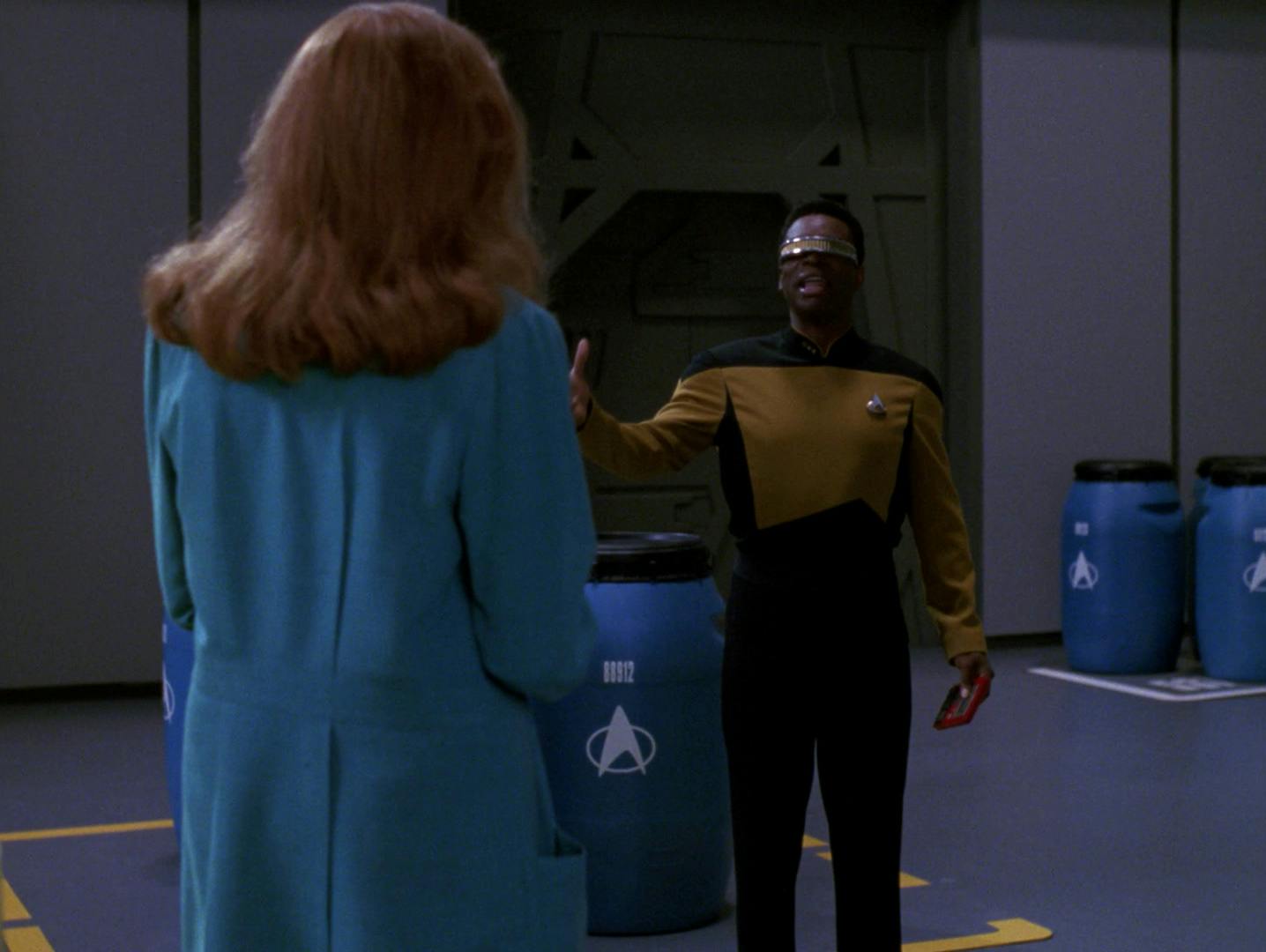
"Disaster"
StarTrek.com
In a dramatic episode where impact with a quantum filament causes the Enterprise crew to be separated in different parts of the ship, facing various dangers in small groups, one lighter moment comes at the start of the episode when Dr. Crusher tries to convince La Forge to audition for another one of her plays.
Although he is reluctant to sing in front of other people, he eventually does do a few lines of “I Am the Very Model of a Modern Major-General,” the famous (and famously challenging) patter song from The Pirates of Penzance by Gilbert and Sullivan. Crusher quickly decides that La Forge was “terrific,” and eagerly puts him down for the role. While this is only a short scene before the main action of the episode, it reminds us of the camaraderie between Crusher and La Forge that will soon be tested as they find themselves trapped in a cargo bay with explosive materials and a radioactive fire in a nearby power conduit.
However, this is not the only time the show has referenced the Major-General’s song. It also came up much more recently, in…
9. Number One (Also) Sings Gilbert and Sullivan
"Q&A," Star Trek: Short Treks
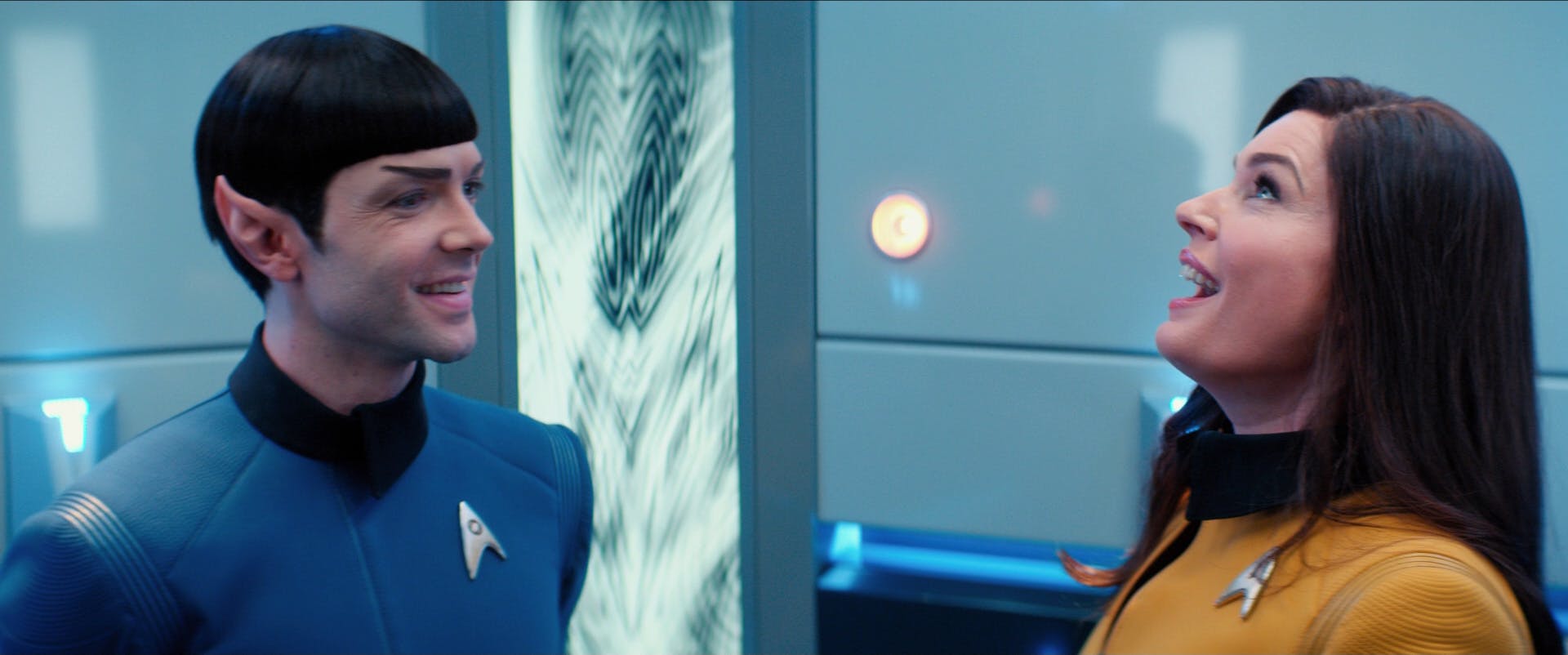
"Q&A"
StarTrek.com
Spock’s first day on the Enterprise also features some singing when he tries to report for duty on the Bridge but instead gets stuck in a turbolift with Number One. While he starts out by asking her questions about Captain Pike and the Prime Directive, the two officers eventually become a bit more relaxed in one another’s presence and share a bonding moment when Number One sings a bit of the Major-General’s song.
Rebecca Romijn, who plays Number One in Discovery and the Short Treks, had told members of the Star Trek production team that singing Gilbert and Sullivan was one of her “special skills,” which inspired writer Michael Chabon to include that moment in the episode.
While this Short Treks bears some resemblances to "Disaster" — the song choice, plus characters being trapped together due to unforeseen circumstances — Chabon says this was coincidental.
“To have it all come together and kind of resonate as an homage to that episode of TNG, it was both accidental I think, but also, deep down, I’m a huge fan of TNG,” he said in an interview with SyFy Wire. “Having that stuff in there. It’s all in there somewhere.”
But humans aren’t the only singers in the Star Trek universe. Plenty of members of other species have an appreciation for the craft, including…
8. Klingon Opera is Known Throughout the Quadrants
Various Episodes
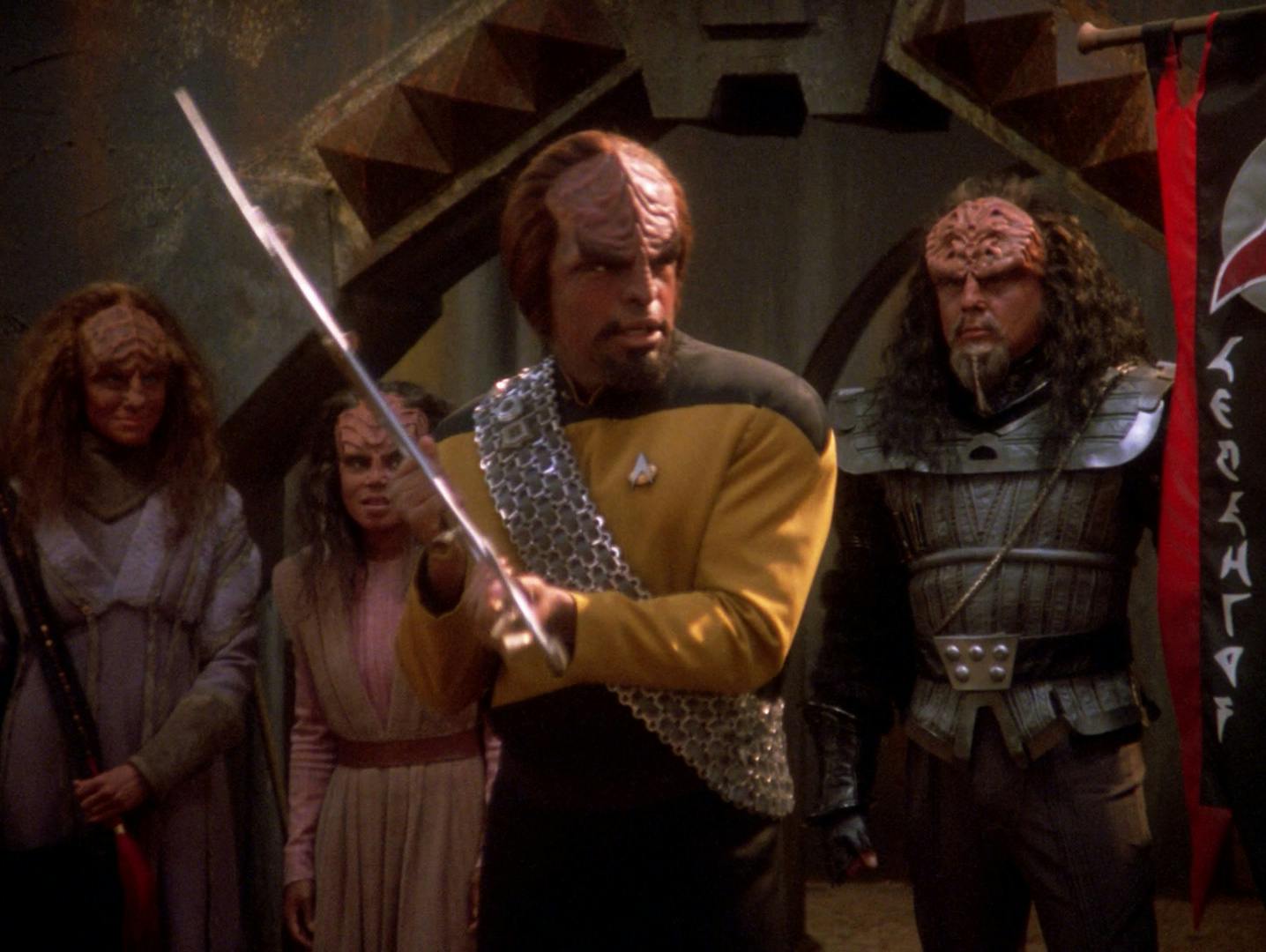
"Firstborn"
StarTrek.com
While human opera features more often than any other species’ take on the genre across Star Trek shows, Klingon opera has also made its mark on the universe and has been referenced, studied, and enjoyed by many characters over the years. Klingon opera, though it tends to have a somewhat aggressive performance style, often focuses on stories of doomed love and courageous acts like much of the human opera canon.
Although some humans have found Klingon opera difficult to listen to — Jonathan Archer described it as reminiscent of a sehlat’s cry — others, like Hoshi Sato, have gone out of their way to seek it out, and Jake Sisko apparently studied it in school.
Worf, in particular, had a large collection of Klingon opera that he listened to and sometimes played over the ship’s speakers, and once requested a passage from the opera "Aktuh and Maylota" from a musician in a bar on Qualor II.
Though Worf rarely admitted it to other crew members, he did enjoy singing along to opera as well as listening to it, which was the focus of a particularly compelling scene in…
7. Worf Sings Klingon Opera While Trapped in an Escape Pod
“Penumbra," Star Trek: Deep Space Nine
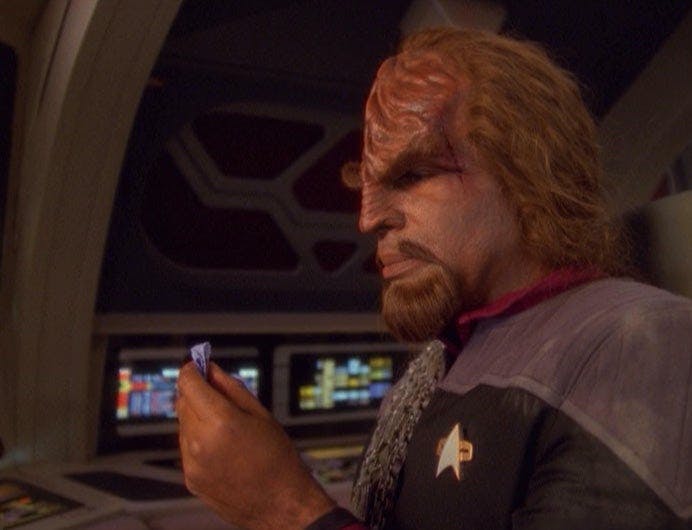
"Penumbra"
StarTrek.com
When Worf’s ship is ambushed by a Dominion patrol, Ezri Dax decides to go looking for him without the captain’s permission and finds his escape pod in the Badlands.
When Worf tells her that the escape pod was “quiet,” Ezri correctly surmises that he passed the time by singing and starts guessing which operas he might have attempted. Though at first he did not want to admit to singing in the first place, he eventually tells her he sang the Klingon opera "Gav’ot toh’va," which she calls “ambitious” for its tenor solos.
In an episode that spends a lot of time focusing on the dynamics between Worf and Ezri since Jadzia’s death and the Dax’s symbiont’s subsequent joining to Ezri, this scene helps to show how some of the memories Worf and Jadzia shared persist in Dax. It is a unique exploration of grief and identity as these characters try to figure out how to relate to one another.
Along with Klingons, other species who have developed their own variants of opera include…
6. The Qomar Discover Music
“Virtuoso,” Star Trek: Voyager
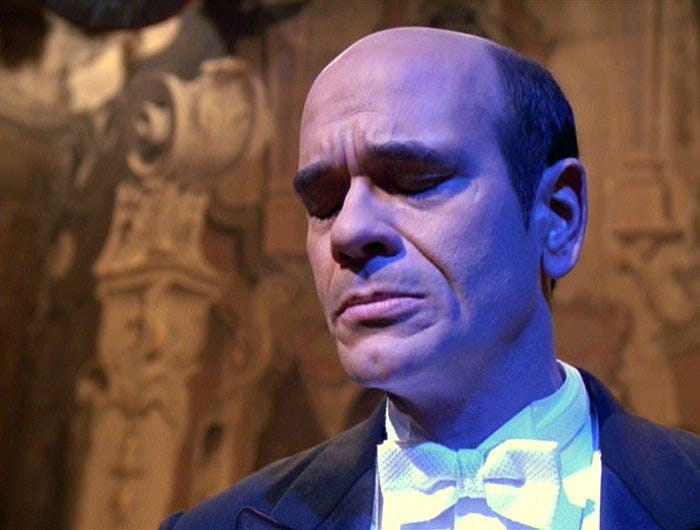
"Virtuoso"
StarTrek.com
The Qomar, a species of mathematicians whose vocal cords were capable of speech but not singing, had never heard music until a chance encounter with Voyager. While some Qomarians were receiving medical treatment on board Voyager, they heard The Doctor singing while he worked, and were captivated by this unfamiliar art form.
They eagerly asked The Doctor to sing for them on their world, and he gave a performance of an aria from Verdi’s Don Carlos that is so well-received he becomes a major Qomarian celebrity.
Some Qomarians attempt to convince The Doctor to stay on their world and sing, and though he is initially tempted by promises of fame and fortune, as well as a chance at love, he soon realizes the Qomarians don’t understand the emotion and artistry of music, and chooses to leave.
However, by the end of the episode, the Qomarians have begun composing and performing their own pieces. Though their music may sound strange to human ears, the genre of Qomarian opera has launched.
This is far from the only time The Doctor’s love of opera has featured in Star Trek. In fact, his musical interests caused major trouble in…
5. The Doctor Risks Losing His Memories
"The Swarm," Star Trek: Voyager
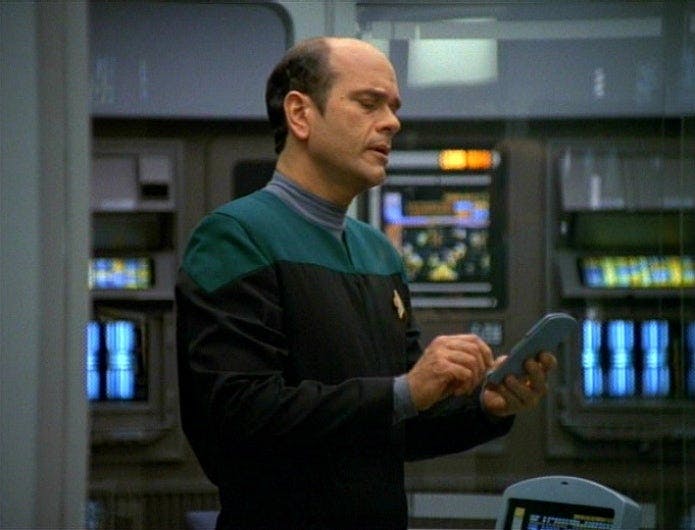
"The Swarm"
StarTrek.com
While studying opera might seem like a harmless pastime, in this episode of Voyager it almost costs The Doctor his entire personality. He was initially designed to only be used in emergencies as a supplement to the medical team, but when Voyager was swept into the Delta Quadrant and their chief medical officer killed, The Doctor became the CMO. His capacity for learning and growth causes problems when he decides to turn it to creative pursuits – or, as Dr. Zimmerman puts it, "[The Doctor] wasn’t programmed to be a tenor, it was programmed to be a physician!”
While The Doctor was apparently supposed to be offline when he wasn’t on duty, he was instead using that time to expand his program, including studying and performing opera. This caused him to burn through the memory and hours of operation capacity that he had been programmed with, risking the integrity of the program.
At the end of the episode, after the ship’s diagnostic program has sacrificed itself to save The Doctor, the crew is able to tell that their CMO’s personality has survived when he starts humming opera as he works.
While The Doctor appears to love opera in general, in some cases, the specific pieces featured on-screen add another layer of meaning to a scene. This was the case in…
4. Captain Picard Listens to Berlioz Before Battle
Star Trek: First Contact
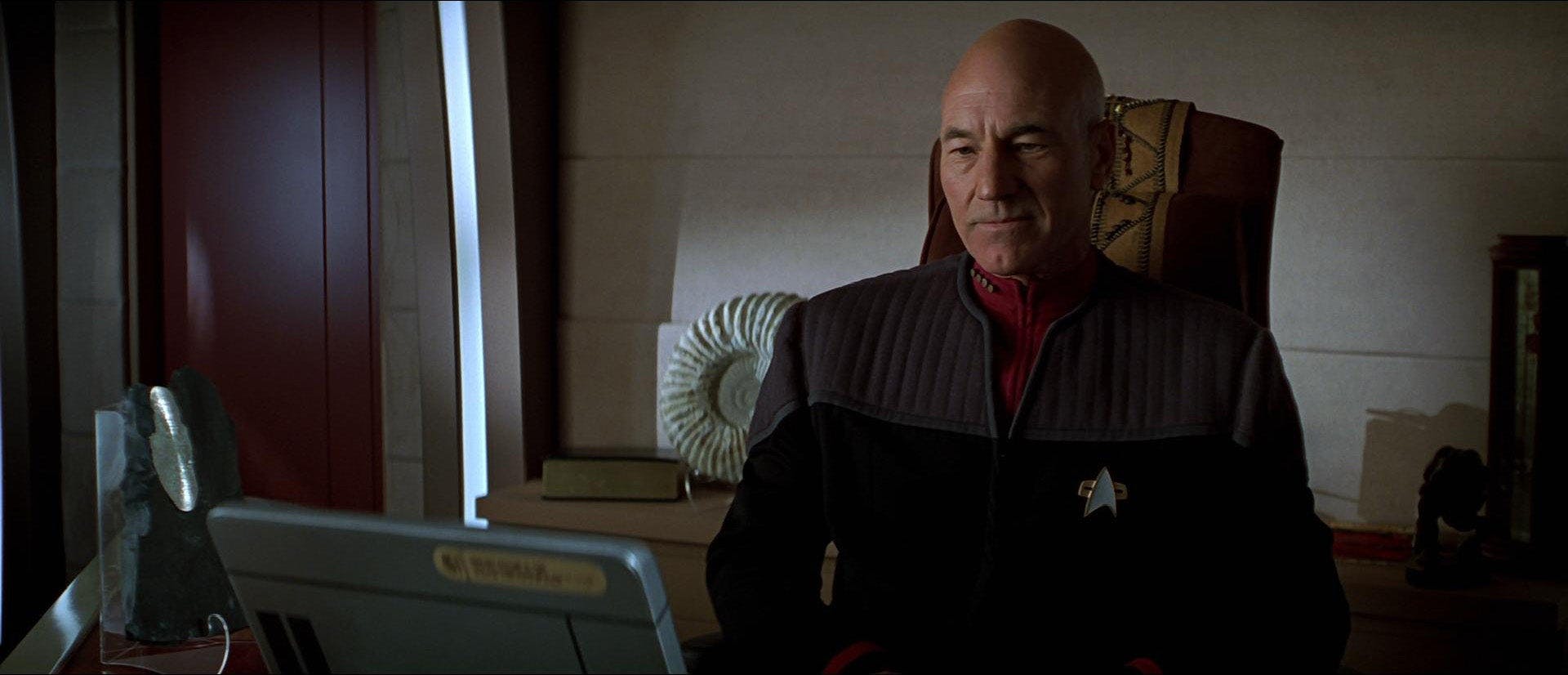
Star Trek: First Contact
StarTrek.com
In this movie, the Federation’s past and present are threatened as the Borg begin attacks in Federation space. Though the Enterprise is the most advanced ship in the fleet, Starfleet orders them to patrol the Romulan Neutral Zone instead of joining the fight, because of fears that Picard’s history with the Borg would compromise his ability to fight.
However, as the battle turns against Starfleet, Picard decides to disobey orders and join the fight. In the scene, before he announces his decision, he is in his Ready Room listening to an aria from Les Troyens, an opera by Berlioz. Les Troyens, which tells the story of the doomed battle for Troy as depicted in the Aeneid, is particularly poignant here as it seems the Borg are winning at every turn.
The particular aria Picard has chosen, Vallon Sonore, is also a bit of subtle foreshadowing. The aria is about a sailor’s longing for a home he may never see again — and later in the movie, the Enterprise is forced to travel to Earth’s past to combat the Borg’s attempts to change history. If they had failed, Earth would never have been "home" again.
Opera has also been used as a reminder of home in...
3. Kasseelian Opera Guides Paul Stamets Back to His Universe
"What’s Past is Prologue," Star Trek: Discovery
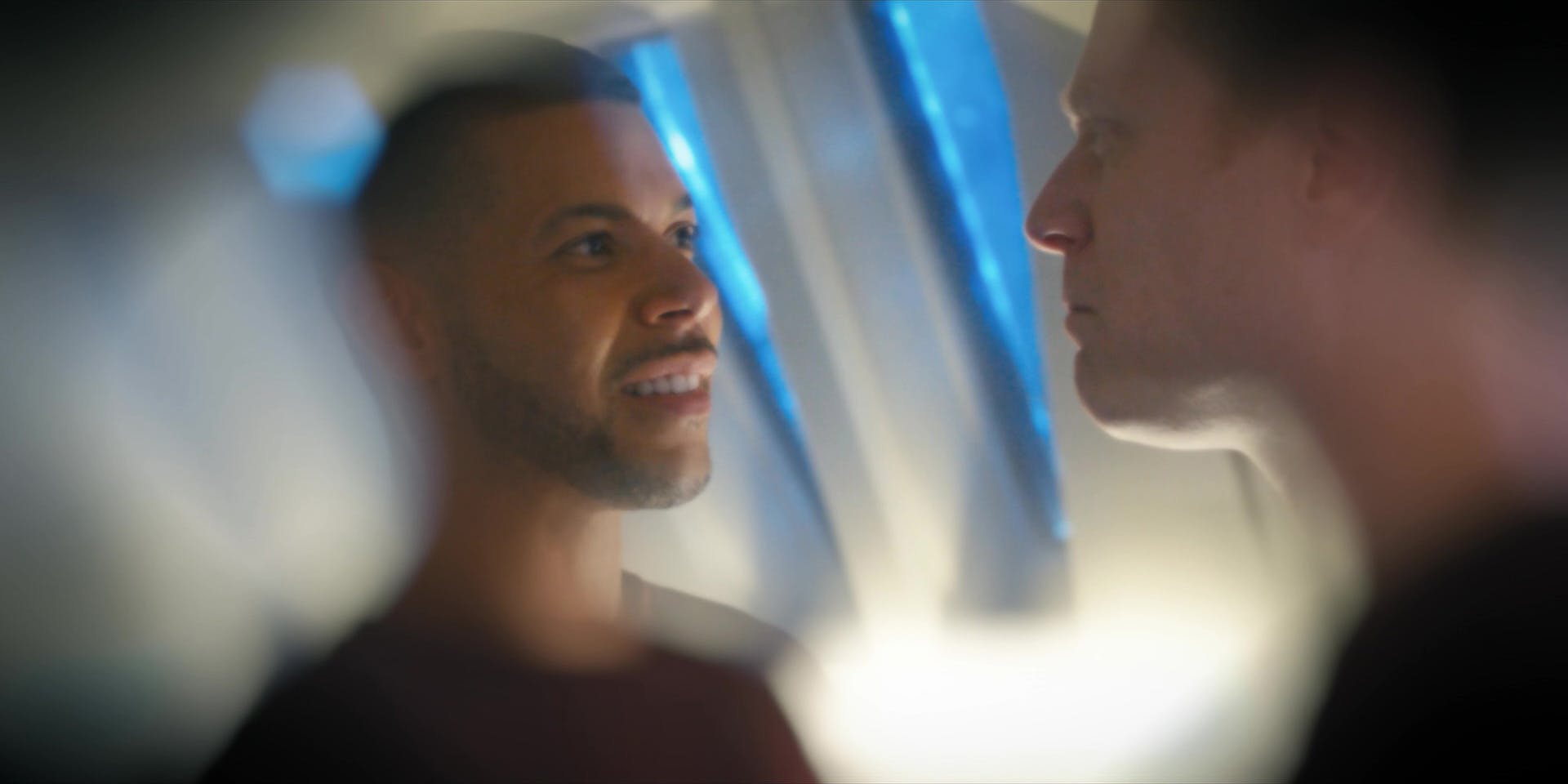
"What's Past is Prologue"
StarTrek.com
When Discovery is stranded in the Mirror Universe, Tilly and Stamets realize that their best bet to getting the ship back home is to ride a “mycelial shockwave” created by attacking the Terran Empire’s flagship and targeting its energy orb.
Though they manage to save the mycelial network from contamination and launch themselves on a course back to their own universe, Stamets struggles to navigate through the quickly-regenerating pathways.
When he can’t figure out which way to go, he has a vision of his partner Hugh Culber telling him that the network is a “thread that weaves life through space” and to “follow the music.” An aria from a Kasseelian opera begins to play, guiding Stamets through the network.
Kasseelian opera has been a recurring theme in Stamets and Culber’s relationship, beginning with...
2. Paul Stamets and Hugh Culber’s First Meeting
"Magic to Make the Sanest Man Go Mad," Star Trek: Discovery
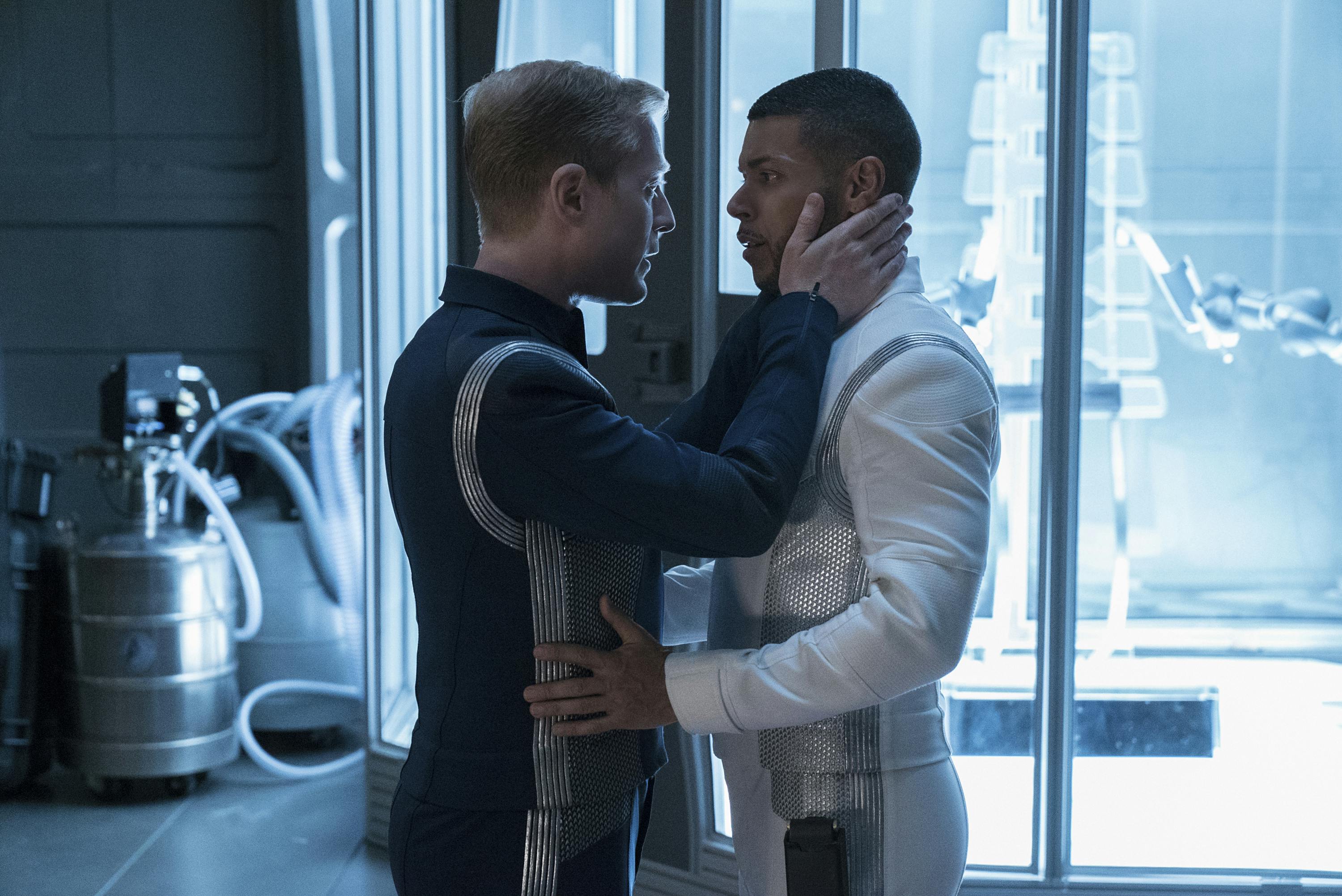
"Into the Forest I Go"
StarTrek.com
When Stamets met Culber in a café on Alpha Centuri, Culber was humming Kasseelian opera. This apparently bothered Stamets so much he told his future partner to "stifle it or sit somewhere else" – and Culber chose to sit next to him instead.
Culber’s love for opera (and Stamets’ growing tolerance of it) has been a recurring theme throughout their relationship. In an earlier episode, “Into the Forest I Go,” Stamets wants to take Culber to go see a Kasseelian production of La Bohème in an opera house on Starbase 46.
Along with being a sweet moment in a tense episode, this also is a subtle reference to the musical Rent, which is based on La Bohème – Anthony Rapp, who plays Stamets in Discovery, originated the role of Mark Cohen in the musical.
While all these operatic moments have enriched and added new dimensions to the episodes they featured in, perhaps nothing better represents the impact opera can have on memories and relationships than…
1. Picard and Worf Distract Data by Singing 'A British Tar'
Star Trek: Insurrection
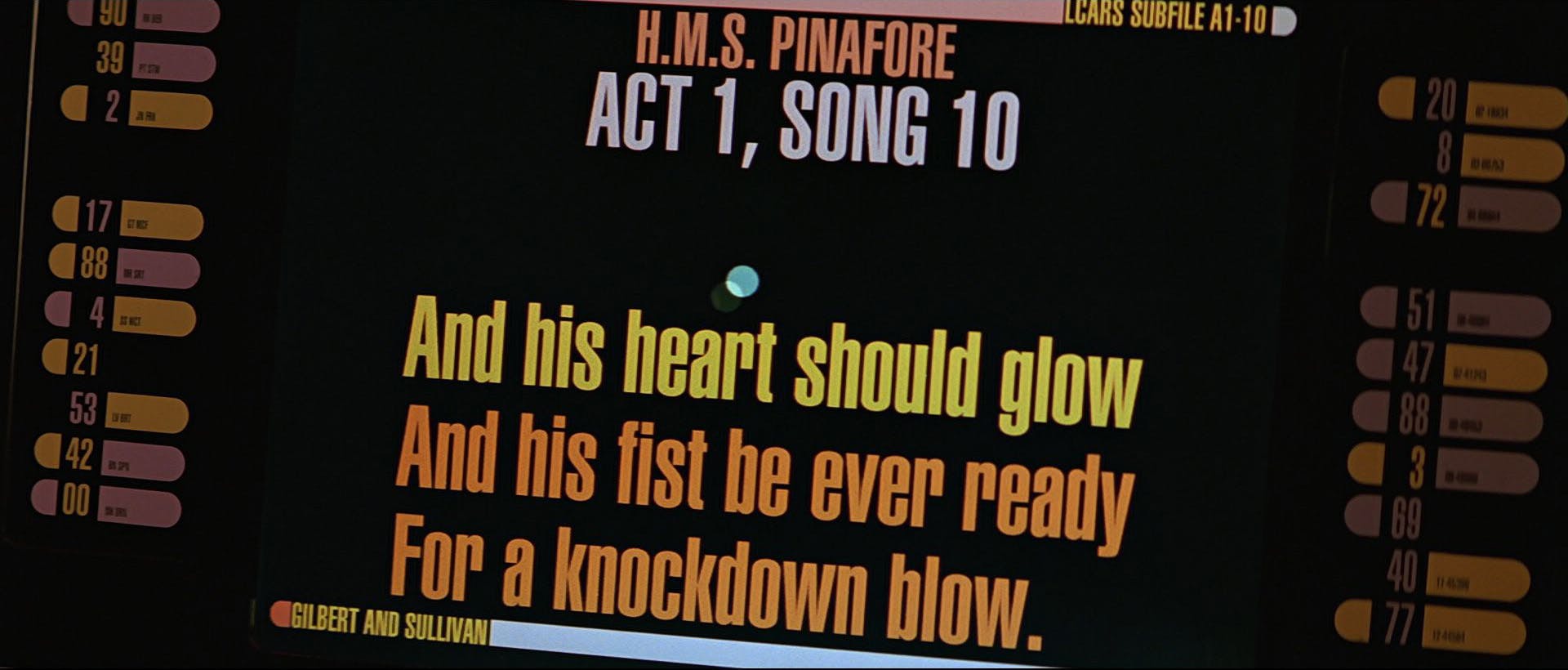
Star Trek: Insurrection
StarTrek.com
When Data is malfunctioning after being shot by a Son’a weapon, he attacks Picard and La Forge when they come to the Ba’ku planet to retrieve him. Although his memory has been damaged and his ethical and moral subroutines have taken over all his basic functions, Data still remembers enough Gilbert and Sullivan to sing along with Picard and Worf.
This distracts the android for long enough to get him back on board the Enterprise. Data’s reaction to familiar music despite his damaged memories is reminiscent of music helping seniors and people with memory loss in real life. In recent years, many studies have found that people experiencing memory loss still relate and respond to music from their youth. Some researchers have even found that musical memories seem to be partially independent of other memory systems and remain intact for longer than other types of memories.
So Data’s ability to remember a familiar tune from an opera, despite having lost access to a significant part of his memory systems, is a wonderful reflection on the importance and endurance of music in both positronic and biological brains.
What are some of your favorite opera moments in Star Trek? Share with us @StarTrek on Social!





